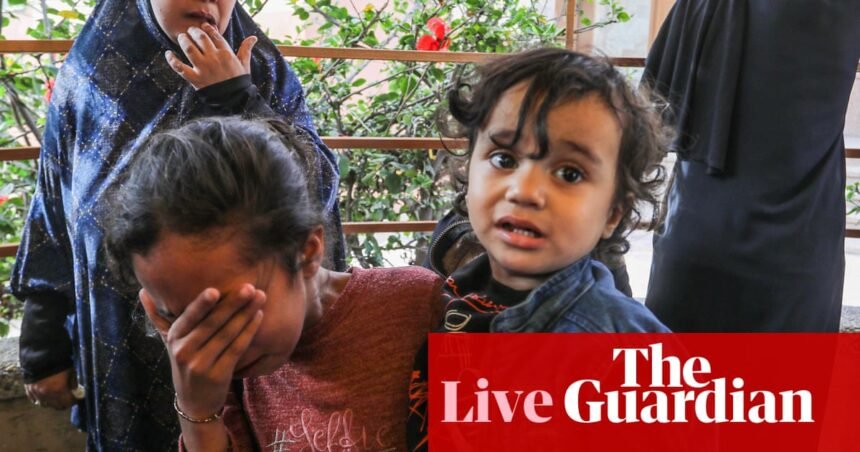Hamas confirms new Gaza ceasefire talks with Israel in Qatar on Saturday
Hamas confirmed a new round of Gaza ceasefire talks with Israel was under way in Qatar’s Doha, group official Taher al-Nono told Reuters.
He said both sides were discussing all issues without “pre-conditions”.
Key events
Here are some images coming in via the newswires today:
Israel-backed food aid group admits it won’t be able to reach most vulnerable in Gaza
Emma Graham-Harrison
The organisation backed by Israel to take over food distribution in Gaza as famine looms has admitted it would not be able to feed some of the most vulnerable civilians from the militarised compounds it plans to set up.
Aid groups and the United Nations have already refused to work with the Gaza Humanitarian Foundation (GHF), a Swiss-registered organisation led by a former US marine. They say it does not have the capacity to end hunger in Gaza and would make it harder to get aid to civilians caught up in other wars by undermining their neutrality.
Israel has not officially laid out its plans for food distribution in Gaza, but statements from the GHF and briefings from Israeli officials envisage four or five militarised distribution centres in southern Gaza, run by private security companies, under the oversight of Israeli military bases.
GHF is in “advanced discussions” with Israel on details and timing and hopes to have news soon, a person involved with planning at the foundation said.
Heads of household would be expected to collect boxes weighing up to 20kg with several days’ supply of food and basic hygiene items like soap for their families. There is no provision for those too sick or weakened by famine to walk long distances across Gaza’s ruined landscape with heavy loads.
“From what we have understood, the plan would increase the ongoing suffering of children and families in the Gaza Strip,” said United Nations Children’s Fund spokesperson Jonathan Crickx.
“How is a mother of four children, who has lost her husband, going to carry 20kg back to her makeshift tent, sometimes several kilometres away?” Crickx said. “The most vulnerable people, including the elderly, people with disabilities, the sick and wounded, and orphans, will face huge challenges to access aid.”
Italian government tells Israel: ‘Enough with the attacks’ in Gaza
Italy’s government on Saturday told Israel to stop deadly military strikes in Gaza, with foreign minister Antonio Tajani saying: “Enough with the attacks.”
“We no longer want to see the Palestinian people suffer,” Tajani said during a trip to Sicily, in remarks relayed by his spokesperson, reports Agence France-Presse (AFP).
“Let’s come to a ceasefire, let’s free the hostages, but let’s leave people who are victims of Hamas alone,” he was cited as saying.
Israel’s military has announced it is in the “initial stages” of a new offensive in Gaza aimed at defeating Hamas. Israel resumed its offensive in Gaza on 18 March, ending a two-month truce in its war against Hamas triggered by the group’s October 2023 attack.
International condemnation has escalated over Israel’s military actions, and its blockage of humanitarian aid entering the Gaza Strip.
Syrian government security forces raided Islamic State hideouts in Aleppo, killing one militant and arresting others, according to Syrian interior ministry spokesperson.
A member of the Syrian security forces was also killed in clashes during the raid, the spokesperson added, according to Reuters.
More than 140 people have been killed in Gaza since Donald Trump left the Middle East on Friday, as Israel launched waves of airstrikes across the Palestinian territory. The attacks, as well as the 10-week long blockade on food and humanitarian aid, has been compared to ethnic cleansing by the UN high commissioner on human rights Volker Türk.
Palestinians described being killed “without warning” and “without mercy” in the latest strikes. Here is the Guardian’s video report:

William Christou
At least 140 Palestinians have been killed in Gaza in the last 24 hours, a deadly escalation as Israel seemed poised to launch a major offensive in the besieged territory.
Israeli strikes in Gaza have killed more than 300 people since Thursday, Palestinian health officials said, one of the deadliest periods in the war since ceasefire talks broke down in March. The intensified bombing campaigns came as Israel’s total blockade on humanitarian aid have prompted fears of a famine in the Palestinian territory.
“Since midnight, we have received 58 martyrs, while a large number of victims remain under the rubble. The situation inside the hospital is catastrophic,” said Marwan al-Sultan, the director of the Indonesian hospital in northern Gaza early on Saturday. The death toll in the last 24 hours was at least 146, according to Reuters.
The escalation in attacks was condemned by the UN human rights chief, Volker Türk, on Friday, who said the bombing campaign was meant to displace Palestinians in Gaza and that it was equivalent to “ethnic cleansing”.
“This latest barrage of bombs … and the denial of humanitarian assistance underline that there appears to be a push for a permanent demographic shift in Gaza that is in defiance of international law and is tantamount to ethnic cleansing,” he said.
Turk’s comments were also echoed by the UN secretary general, António Guterres, who called for a permanent ceasefire while speaking at an Arab League summit in Baghdad on Saturday.
Israel said the bombardments were the initial phases of Operation Gideon’s Chariots, an expansion of the campaign in Gaza meant to “achieve all of the war goals in Gaza”. The strikes were accompanied by a large troop buildup along Gaza’s borders, aimed at establishing “operational control” of parts of Gaza.
Hamas confirms new Gaza ceasefire talks with Israel in Qatar on Saturday
Hamas confirmed a new round of Gaza ceasefire talks with Israel was under way in Qatar’s Doha, group official Taher al-Nono told Reuters.
He said both sides were discussing all issues without “pre-conditions”.

Caolán Magee
Kristyan Benedict, Amnesty International UK’s crisis response manager, called on the government to suspend “all UK arms exports to Israel”.
Speaking to the Guardian, he said:
Right now, Keir Starmer’s government is catastrophically failing to fulfil its legal obligation to act to prevent Israel’s ongoing genocide in Gaza.
Ministers can reverse this destructive position by immediately suspending all UK arms exports to Israel and rejecting Israel’s dangerous and flagrantly illegal attempts to weaponise humanitarian aid.
Although the Labour government suspended most relevant arms export licences to Israel in September, it made an exception for the F-35 fighter jet programme, citing international peace and security concerns.
This week, a high court case was launched challenging the UK’s handling of arms export controls to Israel. The government is defending itself in a judicial review that alleges it acted unlawfully by continuing to supply F-35 parts and components to a global pool, despite the risk that they may be used by Israel in Gaza in ways that could breach international law.
Israel says it has killed Hezbollah commander in south Lebanon
Israel’s military said it killed a local Hezbollah commander on Saturday in south Lebanon, where authorities reported one dead in the fourth Israeli strike within days despite a November ceasefire.
Lebanon’s health ministry said one person was killed in an Israeli “drone strike” on a vehicle in south Lebanon’s Tyre district, reports Agence France-Presse (AFP).
An AFP correspondent said they saw the charred wreckage of a vehicle in Abu al-Aswad, an area about 30 kilometres (20 miles) from the Israeli border.
The Israeli military said in a statement that its forces “struck and eliminated … a commander” involved in “the re-establishment of Hezbollah terrorist infrastructure” in south Lebanon.
Israel has continued to launch strikes on its neighbour despite the 27 November truce which sought to halt more than a year of hostilities with Hezbollah militants including two months of full-blown war.
The Israeli military said that “the rebuilding of terrorist infrastructure and related activity constitutes a blatant violation of the understandings between Israel and Lebanon”.
Earlier this week, the Israeli military said three separate strikes in south Lebanon targeted Hezbollah operatives.
At an Arab League summit in Baghdad on Saturday, Lebanon’s prime minister Nawaf Salam denounced “daily Israeli violations” of Lebanese sovereignty and “the ongoing Israeli occupation of positions” in the south.
He said Lebanon was working to “fully implement” a UN security council resolution that formed the basis of the ceasefire. The resolution says Lebanese troops and UN peacekeepers should be the only forces in south Lebanon, and calls for the disarmament of all non-state groups.
Salam again urged international pressure “to oblige Israel to stop its attacks and immediately and fully withdraw from all Lebanese territory”.
Palestinian President Mahmoud Abbas has urged Arab leaders to unite behind a concrete plan to end the war and rebuild Gaza.
As reported by Qatar News Agency, speaking at the 34th Arab League Summit in Baghdad, Abbas laid out his proposal:
-
A permanent ceasefire in Gaza.
-
Immediate release of all Palestinian detainees and Israeli hostages.
-
Unconditional delivery of relief aid.
-
Total withdrawal of Israeli forces from the Gaza Strip.
-
An international conference in Egypt to implement Gaza’s reconstruction plan.
-
A call for Hamas and other factions to “lay down and hand over their arms” to the Palestinian Authority.
-
Support for a two-state solution in line with UN resolutions and the Arab Peace Initiative.
-
A pledge to hold presidential and legislative elections next year, provided appropriate conditions exist in Gaza, the West Bank, and Jerusalem.
In March, an emergency Arab League summit in Cairo endorsed a plan to rebuild Gaza without displacing its residents.
Earlier we reported the United Nations and major aid groups have expressed concern over plans for aid to be distributed via The Gaza Humanitarian Foundation (GHF) – a Swiss-registered organisation led by a former US marine.
While Israel has not officially detailed its distribution plans, statements from the GHF and briefings from Israeli officials outline a model involving four or five militarised aid centres in southern Gaza, overseen by Israeli military bases.
Henriette Willberg, Head of Research at Law for Palestine, told the Guardian that Palestinian civil society groups are urging states to “reject Israel’s planned distribution mechanisms”, which she said “further weaponises aid and bypasses humanitarian actors”.
She instead called on countries to support the deployment of a “Diplomatic Humanitarian Convoy to Gaza through the Rafah Crossing”, adding that states should “send a diplomatic mission to accompany this convoy”.
“This demand is strongly enshrined in legal principles and states’ responsibilities under international law,” Willberg added.







